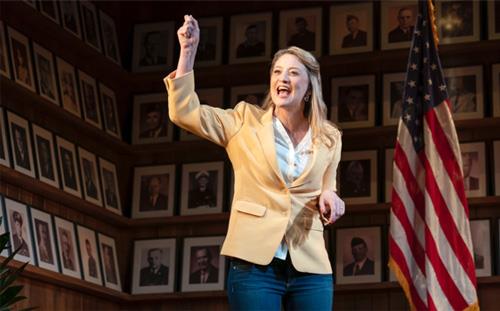
At a moment when we're watching a real-life discussion in the U.S. Senate of "what the Constitution means to me," a rather different approach to that subject pops up starting Friday on Amazon Prime.
What the Constitution Means to Me, a mostly one-woman show written by and starring Heidi Schreck (top), is the filmed version of a production that won numerous awards on Broadway back before the New York stage went into its extended quarantine.
Unlike with some theatrical events, the title of What the Constitution Means to Me precisely and literally describes what the show is about.
Shreck, now in her late 40s, was a teenage Constitution prodigy. When it became clear she had a talent and love for stage performance, her mother steered her into a mini-career as a 15-year-old lecturer on one of America's founding documents.
She entered and won enough contests to earn the scholarship money that sent her to college and launched a post-college entertainment career that has included acting, writing, and producing.
She has written for, among other shows, Nurse Jackie and Billions.
What the Constitution Means to Me doesn't allude to those other shows, drawing solely on Schreck's Constitution phase. She begins by recounting, three-plus decades later, how her well-polished Constitution monologue was delivered and received.
She then uses that experience, as the title promises, to explain how over the years, she has found ever-greater personal meaning in the Constitution, specifically as it relates to four generations of women in her family.
This telegraphs the direction in which What the Constitution Means to Me will be going since the Founding Fathers who wrote the document said pretty much nothing about any founding mothers.
Government was man's work, and history was man's domain, with the womenfolk there to support them, feed them, and make sure they had clean white shirts on the days when dramatic portraits were being painted.
Therefore, since women were granted no explicit rights, like the right to vote, Schreck explains how those who have fought for such rights have often had to go through the sections of the Constitution that allow for flexibility and adaptation.
Like persons of color, women have needed that lifeline as society has shifted – slowly and grudgingly – away from a nation run by and largely for white men.
Schreck doesn't frame her argument as a Constitutional law lecture. Rather, she recounts the story of Grandma Betty, a loving and generous woman who was adored by later generations and who also spent much of her second marriage being beaten by her husband.
This, Schreck explains, illustrates the poisoned legacy of a society that enables and excuses the corrosive behavior of an alpha entity while telling his victim in a hundred ways every day that she has less value.
Family tales in this vein obviously give What the Constitution Means to Me a feminist slant. The closing segment, however, when Shreck brings in a real-time, real-life, teenage costar, rewidens the context of the production.
The two women debate the legacy of the Constitution by asking whether it has outlived its time and needs to be replaced with a new document that addresses matters like gender, race, or the environment.
It's the kind of discussion Schreck may have been tacitly suggesting when she was 15. Now she clearly thinks it's worth asking the question flat-out.
What the Constitution Means to Me looks at its subject through a singular and, at times, narrow prism. In so doing, it raises all the questions whose answers define our country today.